Augustine of Hippo
Dear Brothers and Sisters,
Greetings in Christ. In this season of being together largely apart, we are looking for ways to connect! In this spirit, I am offering a short account of some of the things I have been up to, not only the events themselves but the ideas that accompany them. I find that I am up to the usual things, but in a quite unusual way…it is doubtless similar for you.
The Open budget Zoom discussion
 An unusual year has an unusual budget! We have tried hard to provide assessment relief for congregations, though these cuts are painful, as one could readily hear in this meeting. .]At the same we are meeting our mandate obligation to the national church in solidarity with other dioceses in financial trouble. We are also adding some money for feeding programs both in our diocese and in partner churches in south Dallas, since great need in greater Dallas is also a byproduct of the pandemic. The common thread is responding to the unique situation we find ourselves in.
An unusual year has an unusual budget! We have tried hard to provide assessment relief for congregations, though these cuts are painful, as one could readily hear in this meeting. .]At the same we are meeting our mandate obligation to the national church in solidarity with other dioceses in financial trouble. We are also adding some money for feeding programs both in our diocese and in partner churches in south Dallas, since great need in greater Dallas is also a byproduct of the pandemic. The common thread is responding to the unique situation we find ourselves in.
Renewal
Ministry is like your refrigerator; things get pushed to the back which often require attention. So it is for us, who have as a diocese benefited for many years from the Cursillo movement, which by God’s grace produced many devoted and energetic lay leaders. Renewal Ministries has sought to keep its momentum forward going in this time when meeting is difficult by assembling a taped renewal movement resource. I offered a talk on the sacraments and renewal which began with the image of ‘fire in the fireplace’ (from a book a generation ago by Charles Hummel). The image helps us see how the sacraments provide the focus and form for the work of the Spirit in our lives.
Virtual Discernment Day (August 10th)
Our discernment process continues, in spite of the virus. Ordinands always wade into a church of the future they cannot yet see, and this feels doubly true this year- I appreciate how intrepid they are. Canon Jordan led the event with Sandy Mebus, chair of COM. In my talk I used the example of the contemporary debate about virtual communion as an example of a new question that needs the theological wisdom inherited from the Scriptures to discern aright. (spoiler alert- I think it is a very bad idea!) That kind of wisdom requires the longer and more intense formation which residential seminary can better inculcate.
A brief thank you tour
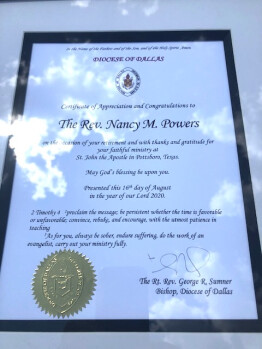
Virginia prepared two impressive testimonial plaques, and I drove to Texoma to offer one to Mike McGrew, who has done yeoman’s work on behalf of Camp All Saints in this difficult season, as well as Mother Nancy Powers, who is retiring after excellent work building up St. John’s, Pottsboro (as well as being a friend of the Camp).
I believe that with God’s help we will be able to build on the efforts of both in the coming period post-Covid.
Prayer for Dallas
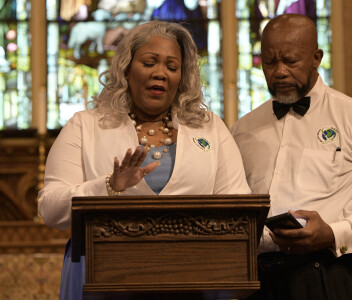
Encouraged by the Mayor, we had an hour of prayer for healing and protection across a diverse spectrum of backgrounds and denominations. As I prayed them the words of the Great Litany rang true to our moment. We were happy to be the host for this event, as a symbol of our spiritual and ecumenical unity. It is of a piece with our helping with feeding programs. The technical term is ‘holism’: evangelism and outreach hand in hand is the definition of mission.
Welcome (August 23 and 26)
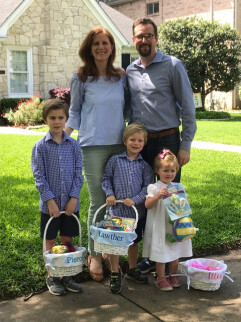
We still have clergy comings and goings in this season, though we are not able yet to do the full kind of induction celebrations we would like to. I had a chance to offer a distanced blessing for Father David Miller (with Keeley) at St. Anne’s, Desoto, as he begins his ministry as priest-in-charge.
Justification (preaching in the Bishop’s Chapel throughout August)
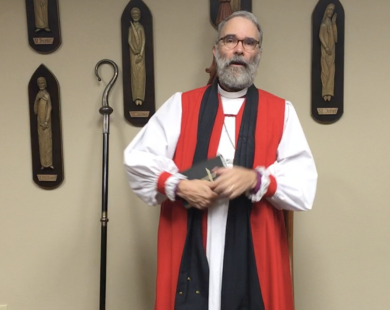
I’ve been preaching on Romans from the lectionary throughout the month, as you may have been doing as well. Parishes have been borrowing the sermons off and on as clergy need them: in the next couple of weeks I believe that Good Samaritan, Dallas, and Resurrection, Plano will be using them. (I am grateful to Bishop Michael Smith who will be taking over this ministry for a month beginning in mid-September, and we hope to have a special mystery guest in the later fall).
I am struck by the way in which this season, of deep awareness of all we can’t do, opens us to the foundational reality of the utterly vicarious nature of our salvation- ‘while we were yet sinner, Christ died for us’ (5:8) so that ‘there is now no condemnation for those who are in Christ Jesus.’ (8:1) Working through Romans is realizing how our house is on rock, though we may not feel so ourselves. Along these same lines, I have been working on a course called ‘Reformation Theology for Catholic Anglicans’ at Nashotah House for 2021. The goal is that students understand that we follow an evangelically catholic form of the Christian life.
APNET
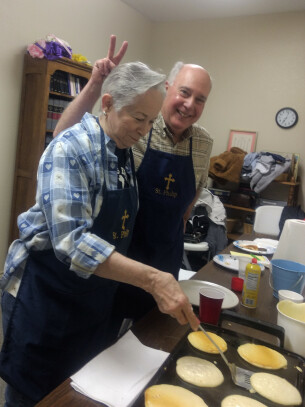
While I haven’t visited in person, I have spent a good deal of time on the phone following the latest news from the Associated Parishes of North East Texas. This is a new and collaborative venture which will constitute a new chapter in the life of this region of our Diocese. The linchpin is Bishop Fraser Lawton, assisting bishop and rector of St. Dunstan’s, Mineola, which functions as the pro-cathedral of the region. Trent Pettit was required to come. Home from his missionary assignment in south west Ethiopia due to COVID and unrest, and has done a good job as the vicar/priest-in-charge of the congregations in St. Philip’s, Sulphur Springs, St. Francis, Winnsboro, St. Mark’s and San Marcos, Mt. Pleasant, and William Laud, Pittsburg (as well as being a curate for St. Dunstan’s. He is supported very ably by the other members of the team, Mother Ethel Channen and Father Gary Hill. Though so much change, we are hopeful that they will find new ways in which they can share one another’s ministries and bear one another’s burdens.
Meanwhile in the alternative reality called ‘Zoom’
Oh the places you’ll go (virtually). I have listened with worry to a bishops’ continuing ed discussion in which some advocate virtual consecration in communion. I have sent a taped prayer of commendation for the family of the late Father George Mutengu in Uganda. I have done some liturgical bits and pieces for our own Convention worship. I have listened to a Zoom conversation with Dr. Anthony Fauci in which he asked faith leaders to exhort their people to get the vaccine when the time comes (which I heartily endorse!) I had a good conversation with our new rector at St. James, Texarkana, Dave Halt, and promised next time we meet he’ll get lunch! He has an array of interests, including a doctorate in Orthodox theology he is working on. And I am preparing for a committee meeting with Archbishop Welby as he works to reconceive the Lambeth Conference in the midst of, and emerging from, COVID, a common disaster experienced differently throughout the world.
Please keep the people and ministries mentioned in your prayers, as well as your own priest and fellow parishioners. And ‘may the Peace of God which passes all understanding keep your hearts and minds in Christ Jesus,’
+GRS
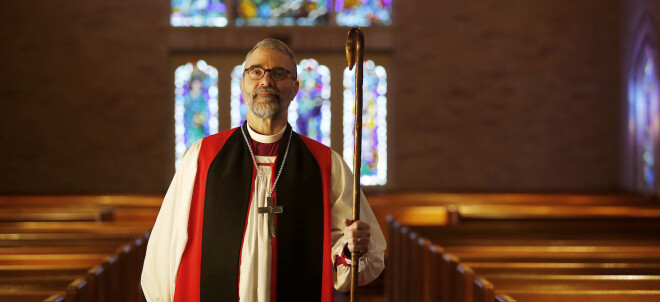



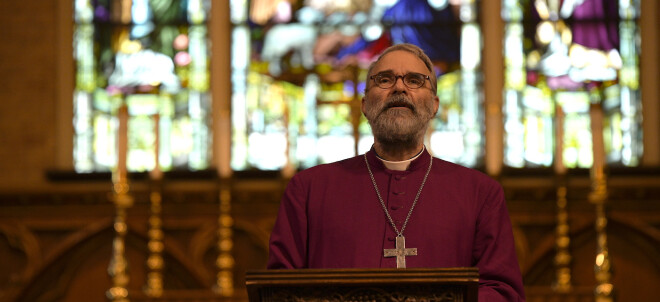
 An unusual year has an unusual budget! We have tried hard to provide assessment relief for congregations, though these cuts are painful, as one could readily hear in this meeting. .]At the same we are meeting our mandate obligation to the national church in solidarity with other dioceses in financial trouble. We are also adding some money for feeding programs both in our diocese and in partner churches in south Dallas, since great need in greater Dallas is also a byproduct of the pandemic. The common thread is responding to the unique situation we find ourselves in.
An unusual year has an unusual budget! We have tried hard to provide assessment relief for congregations, though these cuts are painful, as one could readily hear in this meeting. .]At the same we are meeting our mandate obligation to the national church in solidarity with other dioceses in financial trouble. We are also adding some money for feeding programs both in our diocese and in partner churches in south Dallas, since great need in greater Dallas is also a byproduct of the pandemic. The common thread is responding to the unique situation we find ourselves in.




